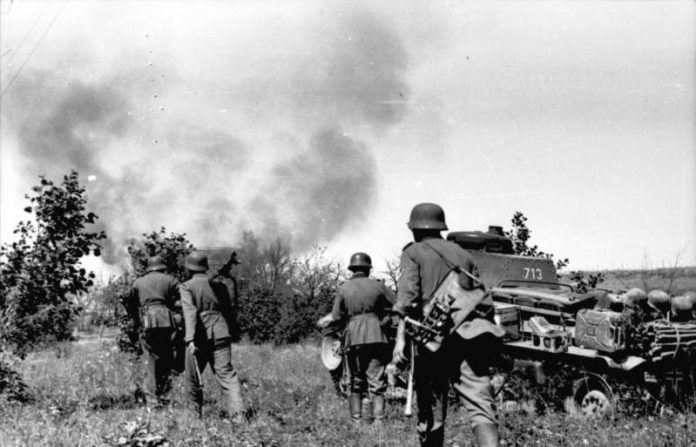På morgonen den 22 juni, 1941 meddelade riksminister Joseph Goebbels världen den häpnadsväckande nyheten att tyska styrkor, tillsammans med finska och rumänska trupper hade anfallit Sovjetunionen. Men varför denna aggression mot Sovjet?
På tysk radio läste Adolf Hitler upp denna historiska proklamation där han också redogjorde för motiven bakom attacken. Bland annat sade han att Stalin hade mobiliserat 160 divisioner förberedda för anfall västerut. Forskning har visat att det i själva verket var mer än 300 sovjetiska divisioner som förberetts mot Tyskland och Europa.
Hitler och hans generaler hade därmed kraftigt underskattat den sovjetiska faran – en ödesdiger felbedömning som i slutändan visade sig vara katastrofal, inte bara för Tyskland. Vi vet idag, med facit i hand, att halva Europa hamnade bakom kommunismens järnridå.
Till den italienska ledaren Benito Mussolini, skrev Hitler att beslutet att angripa Sovjetunionen var ”det svåraste beslutet i mitt liv.” Även om beslutet innebar ett två-fronts krig, något som Hitler särskilt varnade för i Mein Kampf, var detta ett beslut som han aldrig ångrade. Hitlers anfall mot Sovjetunionen, med kodnamnet ”Barbarossa”, har ofta kallats hans värsta och enda militära blunder. Den enorma konflikt som följde slutade fyra år senare, i maj 1945, med hans självmord i Berlin, att sovjetiska styrkor hissade den röda flaggan i tyska riksdagen och att Tyskland ovillkorligt kapitulerade.
Men stämmer verkligen den bild vi idag matas med i media?
Hitlers ”Barbarossa” porträtteras som en förrädisk och oprovocerad överraskningsattack mot ett fredligt land, en attack motiverat av girighet, drömmar om ett världsimperium, avsky mot ryssar och andra slaviska folk och ett sjukligt hat mot kommunismen.
Idag, 70 år senare, fortsätter tyska och ryska historiker att brottas med ursprunget till denna mäktigaste av alla militära konflikter. Eftersom Hitlers proklamation den 22 juni 1941 bidrar till att förklara den tyska ledarens motiv är det ett dokument av stor historisk betydelse.
Texten ges här i sin helhet, tyvärr, enbart på engelska.
German people! National Socialists!
Weighed down with heavy cares, condemned to months-long silence, the hour has now come when at last I can speak frankly.
When on September 3, 1939, the German Reich received the British declaration of war there was repeated anew the British attempt to thwart every beginning of a consolidation of Europe and thereby its rise, by fighting against whatever power on the Continent was strongest at any given time. That is how, in times past, Britain ruined Spain in many wars. That is how she conducted her wars against Holland. That is how later she fought France with the aid of all Europe, and that is how, at the turn of the century, she began the encirclement of the then German Reich and, in 1914, the [First] World War. It was only on account of its internal lack of unity that Germany was defeated in 1918. The consequences were terrible.
After hypocritical declarations that the fight was solely against the Kaiser and his regime, and once the German army had laid down its arms, the annihilation of the German Reich began according to plan.
While the prophecies of a French statesman that there were two million Germans too many — in other words, that this number would have to be eliminated by hunger, disease or emigration — were apparently being fulfilled to the letter, the National Socialist movement began its work of unifying the German people, and thereby initiating the resurgence of the Reich. This rise of our people from distress, misery and shameful disregard was in the form of a purely internal renaissance. In no way did that affect, much less threaten, Britain.
Nevertheless, a new, hate-filled policy of encirclement against Germany began immediately. Internally and externally there came into being that plot, familiar to all of us, between Jews and democrats, Bolsheviks and reactionaries, with the sole aim of inhibiting the establishment of the new German people’s state, and of plunging the Reich anew into impotence and misery.
Apart from us, the hatred of this international world conspiracy was directed against those nations that, like ourselves, were neglected by fortune and were obliged to earn their daily bread in the hardest struggle for existence.
Above all, the right of Italy and Japan, just as much as that of Germany, to share in the goods of this world was contested and in fact was formally denied. The alliance of these [three] nations was, therefore, purely an act of self-protection in the face of the egoistic global combination of wealth and power that threatened them. As early as 1936 [Winston] Churchill, according to statements by the American General Wood before a committee of the American House of Representatives, declared that Germany was once again becoming too powerful and must therefore be destroyed.
In the Summer of 1939 the time seemed to have come for Britain to begin to realize its intended annihilation by repetition of a comprehensive policy of encirclement of Germany. The plan of the campaign of lies staged for this purpose consisted in declaring that other people were threatened, in tricking them with British promises of guarantees and assistance, and of getting them to go against Germany, just as had happened prior to the [First] World War.
From May to August 1939, Britain thus succeeded in broadcasting to the world that Lithuania, Estonia, Latvia, Finland and Bessarabia. as well as Ukraine, were being directly threatened by Germany. Some of these states allowed themselves to be misled into accepting the promise of guarantee proffered with these assertions, thus joining the new encirclement front against Germany. Under these circumstances I considered myself entitled to assume responsibility, before my own conscience and before the history of the German people, not only of assuring these countries or their governments of the falseness of these British assertions, but also of setting at rest the strongest power in the east [the Soviet Union], by especially solemn declarations regarding the limits of our interests.
National Socialists! At that time you probably all felt that this step was a bitter and difficult one for me. The German people has never harbored hostile feelings against the peoples of Russia. However, for more than two decades the Jewish Bolshevik rulers in Moscow had been endeavoring to set aflame not only Germany but all Europe. At no time did Germany ever attempt to carry her National Socialist worldview into Russia, but on the contrary Jewish Bolshevik rulers in Moscow unswervingly endeavored to foist their domination upon us and other European nations, not only by ideological means but above all with military force. The consequences of the activity of this regime were nothing but chaos, misery and starvation in all countries.
I, on the other hand, have been striving for two decades, with a minimum of intervention and without destroying our production, to arrive at a new socialist order in Germany, one that not only eliminates unemployment but also permits the productive worker to receive an ever greater share of the fruits of his labor. The achievements of this policy of national economic and social reconstruction — which strove for a true national community by overcoming rank and class divisions — are unique in today’s world.
It was therefore only with extreme difficulty that I brought myself in August 1939 to send my [Foreign] Minister [von Ribbentrop] to Moscow in an endeavor there to counter the British encirclement policy against Germany. I did this only out of a sense of responsibility toward the German people, but above all in the hope of finally, in spite of everything, achieving long-term detente and of being able to reduce sacrifices that otherwise might have been demanded of us.
While Germany solemnly affirmed in Moscow that the designated territories and countries — with the exception of Lithuania — lay outside any German political interests, a special [supplementary] agreement was concluded in case Britain were to succeed in inciting Poland into actually going to war against Germany. In this case, as well, German claims were subject to limitations entirely out of proportion to the achievements of the German forces.
National Socialists! The consequences of this treaty, which I myself desired and which was concluded in the interests of the German nation, were very severe, particularly for Germans living in the countries concerned. Far more than half a million [ethnically] German men and women, all small farmers, artisans and workmen, were forced to leave their former homeland practically overnight in order to escape from a new [Soviet] regime that at first threatened them with boundless misery and sooner or later with complete extermination.
Nevertheless, thousands of Germans disappeared. It was impossible ever to determine their fate, let alone their whereabouts. Among them were no fewer than 160 men of German Reich citizenship. To all this I remained silent because I had to! For, after all, it was my one desire to bring about a final relief of tension and, if possible, a permanent settlement with this [Soviet] state.
However, already during our advance in Poland, Soviet rulers suddenly, and contrary to the treaty, also claimed Lithuania. The German Reich never had any intention of occupying Lithuania, and not only failed to present any such demand to the Lithuanian government, but on the contrary refused the request of the then Lithuanian government to send German troops to Lithuania in that spirit for that purpose as inconsistent with the aims of German policy.
Despite all this I complied also with this fresh Russian demand. However, this was only the beginning of continually renewed extortions, which have been repeated ever since.
The victory in Poland, which was won exclusively by German troops, prompted me to address yet another peace offer to the Western powers [Britain and France]. It was rejected, due to the efforts of the international and Jewish warmongers. Already at that time the reason for this rejection lay in the fact that Britain still had hopes of being able to mobilize a European coalition against Germany, which was to include the Balkans and Soviet Russia. It was therefore decided in London to send Mr. Cripps as ambassador to Moscow. He received clear instructions under all circumstances to resume relations between Britain and Soviet Russia, and develop them in a pro-British direction. The British press reported on the progress of this mission, except insofar as tactical reasons did not impose silence.
In the fall of 1939 and the spring of 1940 the first results actually made themselves felt. As Russia undertook to subjugate by armed force not only Finland but also the Baltic states, she suddenly motivated this action by the assertion, as ridiculous as it was false, that she must protect these countries from an outside threat, or forestall it. This could only be meant to apply to Germany, for no other power could even intervene in the Baltic area, let alone go to war there. Still I had to be silent. However, those in power in the Kremlin immediately went further.
Whereas in the spring of 1940 Germany, in accordance with the so-called Friendship Treaty [of Sept. 28, 1939, with Soviet Russia], withdrew her forces from the eastern frontier and, in fact, for the most part cleared these areas entirely of German troops, a deployment of Russian forces at that time was already beginning, to an extent that could only be regarded as a deliberate threat to Germany.
According to a statement that [Soviet Foreign Minister] Molotov personally made at that time, there were 22 Russian divisions in the Baltic states alone already in the spring of 1940. Given that the Russian government always claimed that it had been called in by the local population, the purpose of their presence there could only be a demonstration against Germany.
While our soldiers from May 10, 1940, onward were breaking Franco-British power in the west, Russian military deployment on our eastern frontier was continuing to an ever more menacing extent. From August 1940 onward I therefore considered it to be in the interest of the Reich to no longer permit our eastern provinces, which moreover had been laid waste so often before, to remain unprotected in the face of this tremendous deployment of Bolshevik divisions.
Thus, and just as intended by this British-Soviet Russian cooperation, there came about the tying up of such strong [German] forces in the east that a radical conclusion of the war in the west, particularly as regards aircraft, could no longer be vouched for by the German leadership. This, however, was in line with the goals not only of British but also of Soviet Russian policy, for both Britain and Soviet Russia intended to let this war go on for as long as possible in order to weaken all Europe and render it ever more impotent.
Russia’s threatened attack on Romania was in the last analysis equally intended to gain possession of or, if possible, to destroy, an important base of the economic life of not only Germany, but of all of Europe. Since 1933 the German Reich sought with boundless patience to win over states in southeastern Europe as trading partners. We therefore also had the greatest interest in their internal consolidation and order. Russia’s advance into Romania and Greece’s alliance with Britain threatened to quickly turn these regions as well into a general theater of war.
Contrary to our principles and customs, and at the urgent request of the then Romanian government, which was itself responsible for this development, I advised that it acquiesce to the Soviet Russian demands for the sake of peace, and to cede [the province of] Bessarabia. The Romanian government believed, however, that it could answer for this before its own people only if Germany and Italy in compensation would at least guarantee the integrity of what still remained of Romania. I did so with heavy heart, above all because when the German Reich gives a guarantee, that means it also abides by it. We are neither Englishmen nor Jews.
I still believe at this late hour to have served the cause of peace in that region, albeit by assuming a serious obligation of our own. In order, however, finally to solve these problems and achieve clarity concerning the Russian attitude toward Germany, as well as under pressure of continually increasing mobilization on our eastern frontier, I invited Mr. Molotov to come to Berlin.
The Soviet Foreign Minister [during their November 1940 meeting] then demanded Germany’s clarification of or agreement to the following four questions:
Molotov’s first question: Is the German guarantee for Romania also directed against Soviet Russia in case of attack by Soviet Russia against Romania?
My answer: The German guarantee is a general one and is unconditionally binding upon us. Russia, however, never declared to us that she had other interests in Romania beyond Bessarabia. The [Soviet] occupation of Northern Bukovina was already a violation of this assurance. I did not therefore think that Russia could now suddenly have more far-reaching intentions against Rumania.
Molotov’s second question: Russia again feels itself menaced by Finland, Russia is determined not to tolerate this. Is Germany ready not to give any aid to Finland, and above all immediately to withdraw German relief troops marching through to Kirkenes?
My answer: As ever, Germany has absolutely no political interests in Finland. A new war by Russia against the small Finnish nation could not, however, be regarded any longer by the German government as tolerable, all the more so because we could never believe that Finland could threaten Russia. Under no circumstances did we want another theater of war to arise in the Baltic.
Molotov’s third question: Is Germany prepared to agree that Soviet Russia give a guarantee to Bulgaria and, in this regard, send Soviet troops to Bulgaria, in connection with which he — Molotov — was prepared to state that the Soviets did not intend on that account, for example, to depose the King?
My answer: Bulgaria is a sovereign state, and I have no knowledge that Bulgaria had ever asked Soviet Russia for any kind of guarantee such as Romania had requested from Germany. Moreover, I would have to discuss the matter with my allies.
Molotov’s fourth question: Soviet Russia absolutely requires free passage through the Dardanelles, and for her protection also demands occupation of a number of important bases on the Dardanelles and the Bosporus. Is Germany in agreement with this or not?
My answer: Germany is prepared at any time to agree to altering the Treaty of Montreux [1936] in favor of the Black Sea states. Germany is not prepared to agree to Russia’s taking possession of bases on the Straits.
National Socialists! Here I adopted the only attitude that I could adopt as the responsible leader of the German Reich, but also a conscientiously responsible representative of European culture and civilization. The result was to increase the activity in Soviet Russia directed against the Reich, above all, however, the immediate commencement of undermining the new Romanian state from within, and an attempt to remove the Bulgarian government by propaganda.
With the help of confused and immature leaders of the Romanian [Iron Guard] Legion a coup d’etat was staged in Romania whose aim was to overthrow Chief of State General Antonescu and produce chaos in the country so as to eliminate thee legal authority and thus remove the precondition for implementing the German guarantee. I nevertheless still believed it best to remain silent.
Immediately after the failure of this undertaking, there was renewed reinforcement of concentrations of Russian troops on Germany’s eastern frontier. Panzer detachments and parachute troops were transferred in ever increasing numbers to dangerous proximity to the German frontier. The German armed forces and the German homeland know that until a few weeks ago not a single German tank or motorized division was stationed on our eastern frontier.
If any final proof was required for the coalition meanwhile formed between Britain and Soviet Russia, despite all diversion and camouflage, the Yugoslav conflict provided it. While I made every effort to undertake a final attempt to pacify the Balkans and, in sympathetic cooperation with the Duce [Mussolini], invited Yugoslavia to join the Tripartite Pact, Britain and Soviet Russia jointly organized that coup d’etat which, in a single night, removed the government that had been ready to come to agreement.
For today we can inform the German nation that the Serb putsch against Germany did not take place merely under the British, but primarily under Soviet Russian auspices. While we remained silent on this matter as well, the Soviet leaders now went one step further. They not only organized the putsch, but a few days later [April 5, 1941] concluded that well-known friendship treaty with those submissive creatures, which was meant to strengthen the Serbs in their will to resist pacification of the Balkans, and to incite them against Germany. And this was no platonic intention: Moscow demanded mobilization of the Serbian army.
Because, even then, I still believed it better not to speak out, those in power in the Kremlin went still further: The government of the German Reich today possesses documentary evidence proving that Russia, in order finally to bring Serbia into the war, gave her a promise to supply her, by way of Salonika, with weapons, aircraft, munitions and other war materials against Germany. And this happened almost at the very moment that I was advising Japanese Foreign Minister Matsuoka to bring about an easing of tensions with Russia, still hoping thereby to serve the cause of peace.
Only the rapid advance of our incomparable divisions to Skoplje [Skopje], as well as the capture of Salonika itself, frustrated the aims of this Soviet Russian-British plot. Officers of the Serbian air force, however, fled to Russia and were there immediately received as allies.
It was only the victory of the Axis powers in the Balkans that thwarted the plan to tie down Germany this summer in months of fighting in southeastern Europe while meantime steadily completing the deployment of Soviet Russian armies and strengthening their readiness for battle in order, finally, together with Britain and supported by anticipated American supplies, to tie down and then defeat the German Reich and Italy.
Thus Moscow not only broke but miserably betrayed the stipulations of our friendship treaty. All this was done while the rulers in the Kremlin, exactly as in the case of Finland and Romania, up to the last moment pretended peace and friendship and issued seemingly harmless denials.
Although I have been obliged by circumstances again and again to keep silent, the moment has now come when to continue as a mere observer would not only be a sin of omission but a crime against the German people — yes, even against the whole of Europe.
Today something like 160 Russian divisions are standing at our frontier. For weeks there have been constant violations of this frontier, not only affecting us but also in the far north [against Finland], as well as Romania. Russian airmen consider it sport nonchalantly to overlook these frontiers, presumably to prove to us that they already feel themselves masters of these territories. During the night of June 17 to 18 Russian patrols again penetrated into Reich territory, and could only be driven back after prolonged exchange of fire.
This has brought us to the hour when it is necessary for us to counter this plot of Jewish-British warmongers and equally the Jewish rulers of the Bolshevik center in Moscow.
German people! At this moment a deployment of forces is taking place that, in its extent and scope, is the greatest the world hitherto has seen. United with their Finnish comrades, the fighters of the victory of Narvik are standing in the Northern Arctic. German divisions commanded by the conqueror of Norway [General Dietl], together with the heroes of Finnish freedom under their Marshal [Mannerheim], are protecting Finnish soil. Formations of the German eastern front extend from East Prussia to the Carpathians. German and Romanian soldiers are united under Chief of State Antonescu from the banks of the Prut along the lower reaches of the Danube to the shores of the Black Sea.
The task of this front, therefore, is not merely the protection of individual countries, but the safeguarding of Europe, and thereby the salvation of all.
I therefore decided today to once again lay the fate and future of the German Reich and our people in the hands of our soldiers.
May the Lord God help us especially in this fight!











